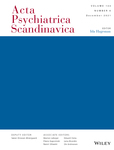Effectiveness and safety of monoamine oxidase inhibitor treatment for bipolar depression versus unipolar depression: An exploratory case cohort study
Abstract
Objective
Patients with bipolar disorder spend most of their clinical lifetime in the depressive phase of their illness. However, antidepressants are discouraged in the treatment of bipolar depression due to concerns over manic induction and drug ineffectiveness. Some reports suggest that monoamine oxidase inhibitors (MAOIs) may be safe and effective compared to other antidepressants in treating bipolar depression. The present study compared the safety and effectiveness of MAOI therapy in patients with bipolar versus unipolar depression.
Methods
Data were collected from approximately 2500 clinical research charts of patients treated with MAOI therapy at a university mood disorder clinic between 1983 and 2015. A mixed-effects model was created with patient entered as the random effect. The model included the primary diagnosis (i.e., either unipolar or bipolar depression) and other clinical covariates as fixed-effect predictors.
Results
Patients with bipolar depression demonstrated lower post-treatment clinical global impressions/severity scores versus patients with unipolar depression (p = 0.04). Neither group demonstrated a full syndromal manic or hypomanic episode. A higher proportion of patients with bipolar depression reported myoclonic tics and tremors, which may have resulted from concomitant lithium use. Amongst the covariates, only the number of prior antidepressant trials predicted poorer outcomes from MAOI therapy.
Conclusion
MAOIs may be more effective—and as safe—for patients with bipolar depression versus unipolar depression. Future studies should explore this possible advantage using a larger sample size.

 求助内容:
求助内容: 应助结果提醒方式:
应助结果提醒方式:


